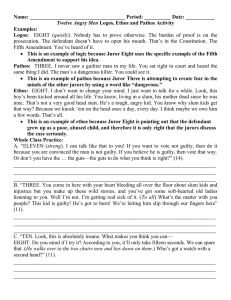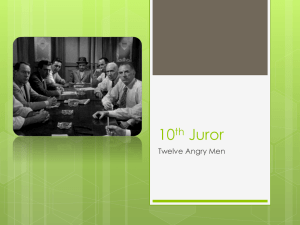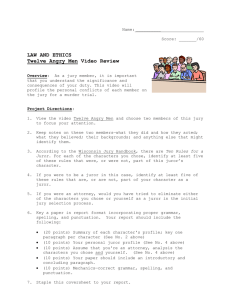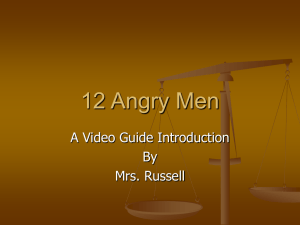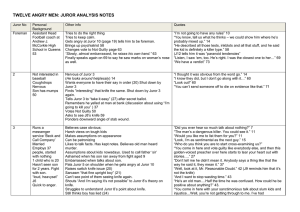Twelve Angry Men Audition Monologues
advertisement
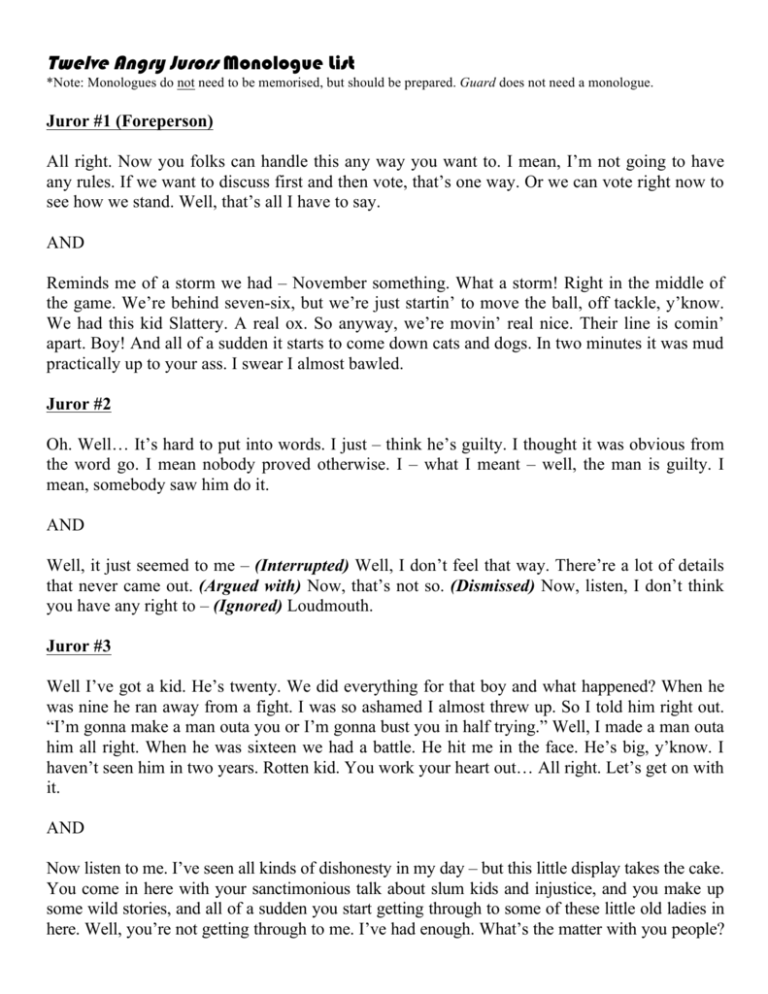
Twelve Angry Jurors Monologue List *Note: Monologues do not need to be memorised, but should be prepared. Guard does not need a monologue. Juror #1 (Foreperson) All right. Now you folks can handle this any way you want to. I mean, I’m not going to have any rules. If we want to discuss first and then vote, that’s one way. Or we can vote right now to see how we stand. Well, that’s all I have to say. AND Reminds me of a storm we had – November something. What a storm! Right in the middle of the game. We’re behind seven-six, but we’re just startin’ to move the ball, off tackle, y’know. We had this kid Slattery. A real ox. So anyway, we’re movin’ real nice. Their line is comin’ apart. Boy! And all of a sudden it starts to come down cats and dogs. In two minutes it was mud practically up to your ass. I swear I almost bawled. Juror #2 Oh. Well… It’s hard to put into words. I just – think he’s guilty. I thought it was obvious from the word go. I mean nobody proved otherwise. I – what I meant – well, the man is guilty. I mean, somebody saw him do it. AND Well, it just seemed to me – (Interrupted) Well, I don’t feel that way. There’re a lot of details that never came out. (Argued with) Now, that’s not so. (Dismissed) Now, listen, I don’t think you have any right to – (Ignored) Loudmouth. Juror #3 Well I’ve got a kid. He’s twenty. We did everything for that boy and what happened? When he was nine he ran away from a fight. I was so ashamed I almost threw up. So I told him right out. “I’m gonna make a man outa you or I’m gonna bust you in half trying.” Well, I made a man outa him all right. When he was sixteen we had a battle. He hit me in the face. He’s big, y’know. I haven’t seen him in two years. Rotten kid. You work your heart out… All right. Let’s get on with it. AND Now listen to me. I’ve seen all kinds of dishonesty in my day – but this little display takes the cake. You come in here with your sanctimonious talk about slum kids and injustice, and you make up some wild stories, and all of a sudden you start getting through to some of these little old ladies in here. Well, you’re not getting through to me. I’ve had enough. What’s the matter with you people? Every one of you knows this kid is guilty. He’s got to burn. We’re letting him slip through our fingers here. Juror #4 Now suppose we take these facts one at a time. One. The boy admitted going out of his house at eight o’clock on the night of the murder after being hit several times by his father. Two. The boy went directly to a neighbourhood junk shop where he bought a switch-blade knife. Three. This wasn’t what you’d call an ordinary knife. It had a very unusual carved handle. Four. The storekeeper who sold it to him identified the knife in court and said it was the only one of its kind he had ever had in stock. Five. At, oh, about eight forty-five the boy ran into three friends of his in front of a diner. The boy talked with his friends for about an hour. During this time they saw the switch-knife. Six. Each of them identified the death weapon in court as that same knife. Seven. The boy arrived home. Ladies and gentlemen, this case is based on a reasonable and logical progression of facts. Let’s keep it there. Juror #5 I hate these things. I grew up with them. Too many of them. On my stoop. In my backyard. Switch-knives came with the neighbourhood where I lived. Funny, I wasn’t thinking of it. I guess you try to forget these things. You don’t use this kind of knife that way. You have to hold it like this to release the blade. In order to stab downwards, you would have to change your grip. Like that. Anyone who’s ever used a switch-knife’d never handle it any other way. Juror #6 I don’t know. I started to be convinced, uh – you know, very early in the case. Well, I was looking for the motive. That’s very important. If there’s no motive, where’s the case? So anyway, that testimony from those people across the hall from the kid’s apartment, that was very powerful. Didn’t they say something about an argument between the father and the boy around seven o’clock that night? I mean, I can be wrong… Well, it doesn’t actually prove anything. It’s just a part of the picture. I didn’t say it proved anything. Juror #7 This better be fast. I got tickets to a ball game tonight. Yankees – Cleveland. We got this new kid pitching, Modjelewski, or whatever his name is. He’s a bull, this kid. Shhooooom. A real jug handle. (There is no reaction from listener) You’re quite a ball fan, aren’t you? AND Say, are you a salesman? You know what the soft sell is? You’re pretty good at it. I’ll tell ya. I got a different technique. Jokes. Drinks. Knock ‘em on their asses. I made twenty-seven thousand last year selling marmalade. That’s not bad. Considering marmalade. What are ya getting out of it – kicks? The boy is guilty, pal. So let’s go home before we get sore throats. Juror #8 I just want to talk. I don’t know what I believe. There were eleven votes for ‘guilty.’ It’s not easy for me to raise my hand and send a boy off to die without talking about it first. I’m not trying to change your mind. It’s just that we’re talking about somebody’s life here. I mean, we can’t decide in five minutes. Suppose we’re wrong? Look, this boy’s been kicked around all his life. I think maybe we owe him a few words. That’s all. AND It’s very hard to keep personal prejudice out of a thing like this. And no matter where you run into it, prejudice obscures the truth. Well, I don’t know what the truth is. No-one ever will, I suppose. Nine of us now seem to feel that the defendant is innocent, but we’re just gambling on probabilities. We may be wrong. We may be trying to return a guilty man to the community. No-one can really know. But we have a reasonable doubt, and this is a safeguard which has enormous value in our system. No jury can declare a man guilty unless it’s sure. We nine can’t understand how you three are still so sure. Maybe you can tell us. Juror #9 It’s just that I looked at him for a very long time. The seam of his jacket was split under his arm. Did you notice it? I mean, to come into court like that. He was a very old man with a torn jacket and he walked very slowly to the stand. He was dragging his left leg and trying to hide it because he was ashamed. I think I know him better than anyone here. This is a quiet, frightened, insignificant old man who has been nothing all his life, who has never had recognition, his name in the newspapers. Nobody knows him, nobody quotes him, nobody seeks his advice after seventy-five years. That’s a very sad thing, to be nothing. Juror #10 I don’t understand you people. How can you believe his story? You know what they’re like! They think different. They act different. They don’t need any big excuse to kill someone. Well, that’s true. Everybody knows it. They get drunk on wine or something cheap like that. Oh, they’re very big drinkers. And then they’re drunk, and all of a sudden – BANG – somebody’s lying dead in the gutter. OK, nobody’s blaming them for it. That’s how they are, by nature, y’know what I mean? Violent. Human life doesn’t mean as much to them as it does to us. Family don’t mean anything to them. They breed like animals. That kid on trial, his type, they’re multiplying five times as fast as we are. They’re gonna breed us out of existence. I’m warning you. This boy, this boy on trial here. We’ve got him. That’s one at least. I say get him before his kind gets us. I don’t give a goddamn about the law. Why should I? They don’t. Juror #11 Pardon. This fighting. This is not why we are here, to fight. We have a responsibility. This, I have always thought, is a remarkable thing about democracy. That we are, uh, what is the word? Notified. That we are notified by mail to come down to this place and decide on the guilt or innocence of a man we have never heard of before. We have nothing to gain or lose by the verdict. This is one of the reasons we are strong. We should not make it a personal thing. Juror #12 Looks like we’re really hung up here. I wish I knew how we could break this up. Y’know, in advertising… I told you I worked at an ad agency, didn’t I? Well, there are some pretty strange people – not strange, really – they just have peculiar ways of expressing themselves, y’know what I mean? Anyway, I was telling you – in the agency, when they reach a point like this in a meeting, there’s always some character ready with an idea. And it kills me, I mean it’s the weirdest thing sometimes the way they precede the idea with some kind of phrase. Like – oh, some account exec’ll say, “Here’s an idea. Let’s run it up the flagpole and see if anyone salutes it,” or “Put it on a bus and see if it gets off at Wall Street.” I mean, it’s idiotic, but it’s funny. Voice of Judge … and that concludes the court’s explanation of the legal aspects of this case. And now, ladies and gentlemen of the jury, I come to my final instruction to you. Murder in the first degree – premeditated homicide – is the most serious charge tried in our criminal courts. You’ve listened to the testimony and you’ve had the law read to you and interpreted as it applies to this case. It now becomes your duty to try and separate the facts from the fancy. One man is dead. The life of another is at stake. In the event you find the accused guilty, the bench will now entertain a recommendation for mercy. The death sentence is mandatory in this case.

